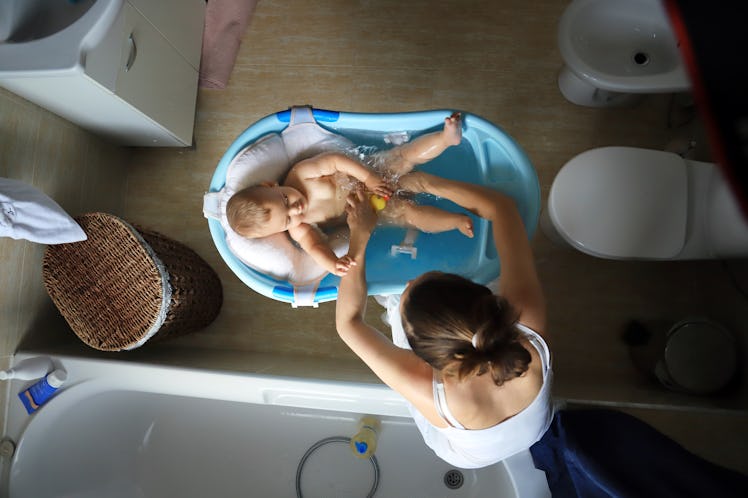How To Clean A Baby’s Penis And Foreskin
Yeah, it’s awkward. But circumcised or not, parents have an obligation to keep their child clean and healthy.

Circumcision is a big decision often made without very much analysis — in many cases, when it is discussed, it’s often fairly late in the game. There is some evidence that indicates there are life-long medical benefits to circumcision and little impact on sex life (both court some degree of controversy), but most of the time it comes down to religious, ethical, and cultural beliefs. Either way, parents are going to have to prioritize keeping their kid’s penis clean. That’s just part of having a kid with a penis. Fortunately, it’s not too hard.
“Regardless of whether or not you have a circumcised child or not, you have to be comfortable with maintaining hygiene,” explains Kenneth Strzelecki, D.O., a pediatrician at Children’s Hospital of Wisconsin.
Cleaning a Baby’s Circumcised Penis
Unsurprisingly, the most care needs to be taken with newly circumcised boys.
For newborns, medical circumcision is usually performed in the hospital on the second or third day of life; religious ritual circumcisions are usually performed in the second week of life. Both require cutting away living tissue, and that means there is vulnerable skin during the healing stage, which can take up to ten days.
It’s not as scary as it sounds; parents can easily manage care at home by following their pediatrician’s instructions. A small amount of Vaseline and a gauze pad may be used after the surgery and for a few days afterward — the particular schedule is determined by the doctor performing the circumcision. The trickiest part may be keeping it clean and dry, but changing diapers promptly (also recommended to prevent diaper rash), gently rinsing with a dye- and perfume-free soap and water, and allowing it to air dry, can accomplish that with minimal discomfort to the child.
After the healing period, parents will still need to take care to avoid adhesions, where the skin cells of one part of the penis stick to and start to grow with another part of the penis. “Just because your son had a circumcision doesn’t mean that there’s no other hygiene measures needed,” says Strzelecki. “You still need to pull that skin back and you want to start looking for areas where maybe it has re-adhered to the glans of the penis. Those usually start as small little skin bridges that can be easily separated with just a little bit of tension.”
This is not as traumatic as it may sound. The penis needs to be thoroughly cleaned at least once a day anyway, with the folds of the penis, the space between the scrotum and thighs, and the rolls of chubby baby legs inspected to make sure errant poop particles aren’t caught and irritating the skin.
Cleaning a Baby’s Uncircumcised Penis
A newborn with an uncircumcised penis obviously doesn’t have any trauma from a circumcision, so there’s no need for a healing period. A condition called balanitis — which occurs when debris or bacteria is trapped under the foreskin — is more common with uncircumcised babies. But it’s still fairly uncommon and, though painful, not serious.
The foreskin and the area around the urethra need to be cleaned, just like anything else. But most babies’ foreskins do not retract fully, and may not for years.
“You do want to clean that area while exercising a little bit of tension,” advises Strzelecki. “Sometimes there may be skin cells and other natural debris trapped in there, and that just wipes away.”
It may seem uncomfortable to consider, but parents shouldn’t shirk this duty because it feels weird. Strzelecki has seen many patients with adhesions well into school age because parents didn’t want to deal with cleaning their baby’s penis. But it’s not something that a baby can do for themself yet.
Once a boy starts to phase out of diapers, cleaning his penis can become his responsibility. Like potty training or brushing teeth, it’s not something a kid knows intuitively; he learns it from his parents.
And when it is time to teach, don’t be weird about it. “If it’s not awkward at the start, it’s not awkward at age 4 or 5,” says Strzelecki. “Use clinical terms — don’t make up cute names. That way it avoids the awkwardness.”
Parents shouldn’t be shy about voicing their questions and concerns to their pediatrician. And circumcised or not, parents need to be able to take care of their children and teach them to take care of themselves. It’s not weird unless somebody makes it weird.
This article was originally published on